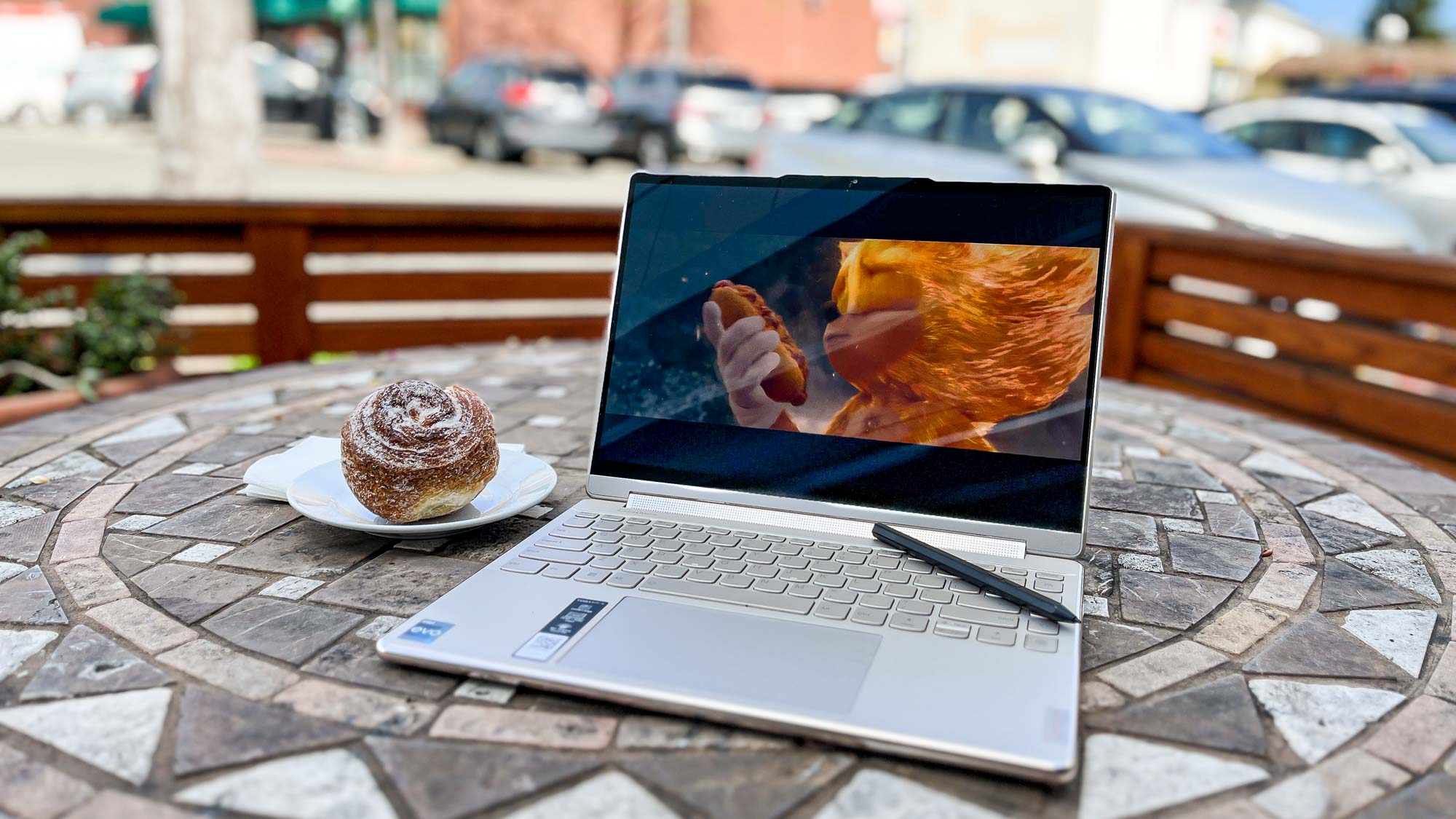
Price: $1,399 to start
CPU: 13th Gen Intel Core i7-1360P
GPU: Intel Iris Xe integrated graphcis
RAM: 16GB LPDDR5-5200
Storage: 512GB SSD
Display: 14-inch 2.8K (2,880 x 1,800 pixels) OLED touchscreen
Ports: 2 Thunderbolt 4, 1 USB-A, 1 USB-C, 1 headphone jack
Battery life: 10 hours and 10 minutes (tested)
Size: 12.52 x 9.06 x 0.6 inches
Weight: 3.09 pounds
The Lenovo Yoga 9i Gen 8 ($1,399 to start) is a refinement of excellence, improving upon its predecessor in minor but meaningful ways which cement it as one of the best 2-in-1 laptops on the market.
This premium convertible offers the beauty of a 14-inch OLED touchscreen, the power of Intel's 13th Gen Raptor Lake processors and enough battery life to get you through a day at work or school. Plus, it comes with its own stylus and carrying sleeve, making it a compelling choice for creatives on the go. However, the stylus is easier to lose than ever because the Yoga 9i no longer has a built-in charging garage where you can stow it when not in use.
There are some other key details you need to know about to decide whether this is the laptop for you. In this Lenovo Yoga 9i Gen 8 review I'll walk you through them and show how well our review unit held up in both expert testing and my own day-to-day use, all of which convinced me it's one of the best Windows laptops on the market right now and one of the best laptops overall.
Lenovo Yoga 9i Gen 8 review: Price & configuration
- $1,399 to start, available April 10
- Stylus and carrying case included
The Lenovo Yoga 9i Gen 8 is scheduled to go on sale April 10 for a starting price of $1,399. It's available in either Storm Grey or Oatmeal color schemes, and should be available for purchase via Lenovo's website and select third-party retailers. Every unit comes with a black active stylus and grey fabric sleeve at no additional charge.
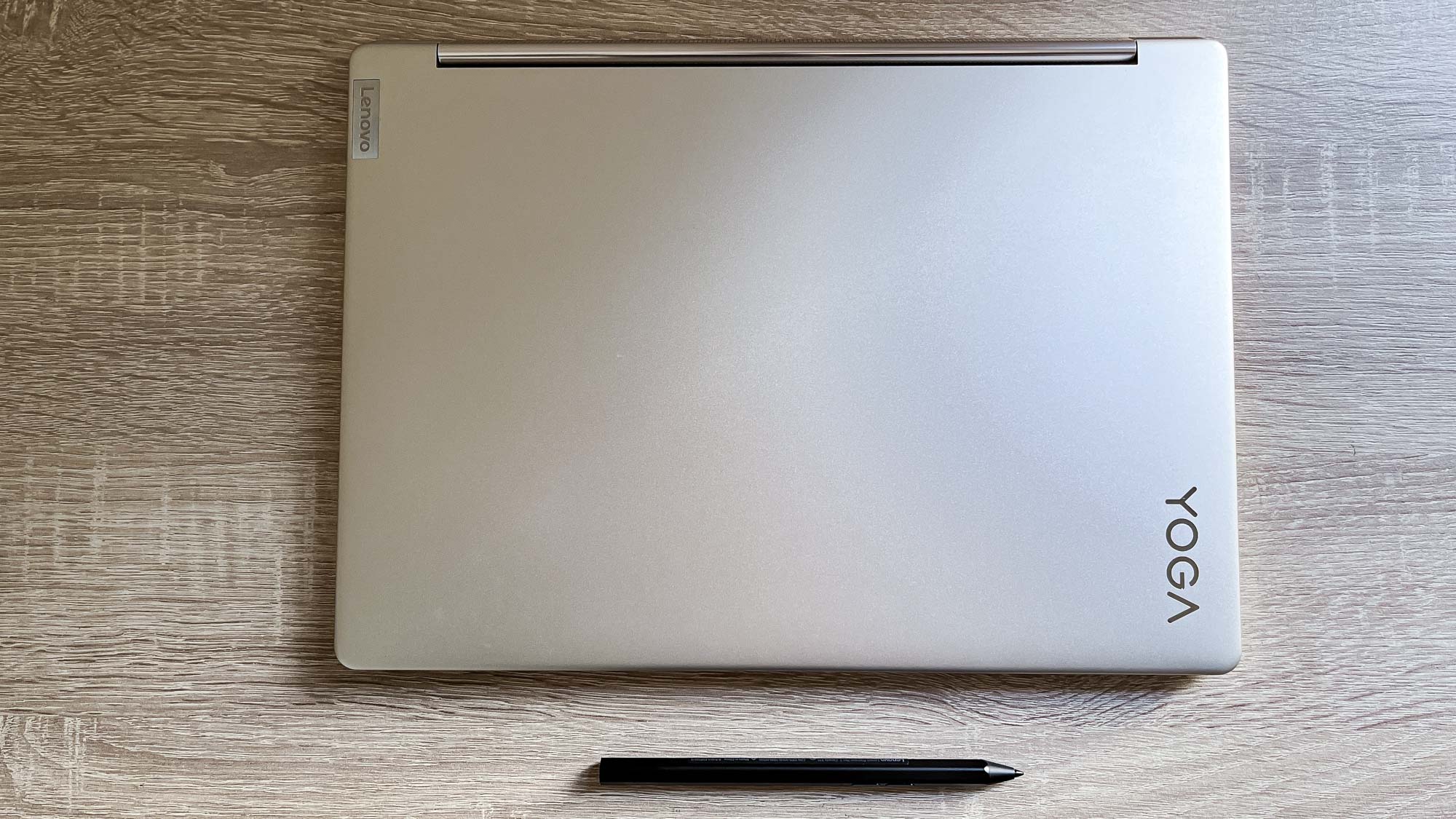
Lenovo sent us a Yoga 9i Gen 8 review unit in Oatmeal with an Intel Core i7-1360P CPU, 16GB of RAM, a 512GB SSD and a 2.8K OLED touchscreen.
Lenovo Yoga 9i Gen 8 review: Design
- Elegant chassis looks great, comfortable to use as tablet/laptop
- Lack of a stylus charging garage hurts
Our Lenovo Yoga 9i Gen 8 review unit is sleek and smooth to the touch, with rounded corners to lend the machined aluminum chassis a premium feel. Lenovo is keen to point out that these rounded edge make the Yoga more comfortable to hold in tablet form, and it's true. Flip the screen back to lay flat and the Yoga 9i Gen 8 is remarkably comfortable to hold — for a 14-inch laptop.
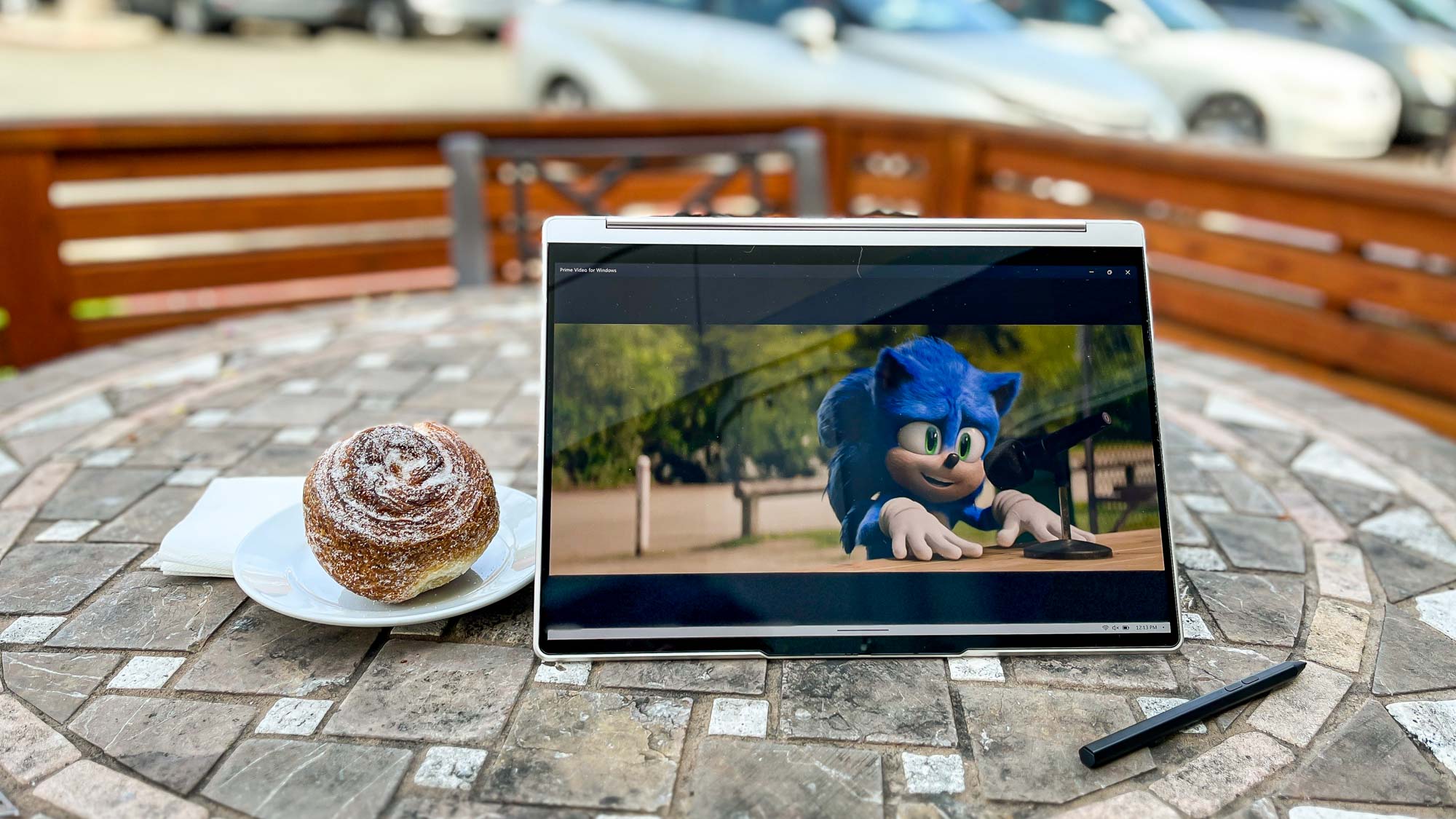
You won't confuse it for an iPad anytime soon, but at 12.52 x 9.06 x 0.6 inches thick and upwards of 3.09 pounds it's pretty thin and light. The Yoga 9i is actually a smidge lighter than the old 13.3-inch Samsung Galaxy Book2 Pro 360, a perennial top-tier contender for best 2-in-1 laptop here at Tom's Guide. However, Lenovo's premium 2-in-1 is still a bit thicker and/or heavier than competing 14-inchers like the Acer Swift 5 (2.65 pounds, 0.59 inches thin) and Acer Spin 5 (2.9 pounds, 0.65 inches).
Ounces and inches aside, the Yoga 9i is a great choice if you want a Windows laptop that you can use as a tablet in comparable comfort. The included stylus and carrying sleeve (which come in black and a nice textured grey, respectively) add to the laptop's value for those who plan to use it on the go.
That said, the fabric loop on the laptop sleeve that's intended to hold the stylus is no substitute for a proper built-in charging garage. Older versions of the Yoga 9i used to have a little garage for the stylus built into the laptop, so you could both safely store the stylus and charge it when not in use.
That garage was removed a few iterations back, and this laptop is less for its loss. Yes, the stylus is still included gratis and you can still charge it via a USB-C charging cable, but what was once a slick touch that added value is now a nice-to-have hassle that you have to worry about misplacing.
Lenovo Yoga 9i Gen 8 review: Ports
- Enough ports to get by, but no HDMI or SD card reader
- Power button on the side takes some getting used to
You get a load of USB-C ports, a USB-A port, a headphone jack and not much else on the Yoga 9i Gen 8. It's the bare minimum you should expect from a modern ultraportable and enough to get you through an average workday, though you don't get HDMI ports like you do on the Swift 5 and Spin 5.

Still, you can get by just fine with the port array on the Lenovo Yoga 9i Gen 8. On the laptop's lefthand side you get your USB-A port and two Thunderbolt 4/USB4 ports. On the righthand side you get a 3.5mm headphone/mic jack, a USB-C port and the power button.
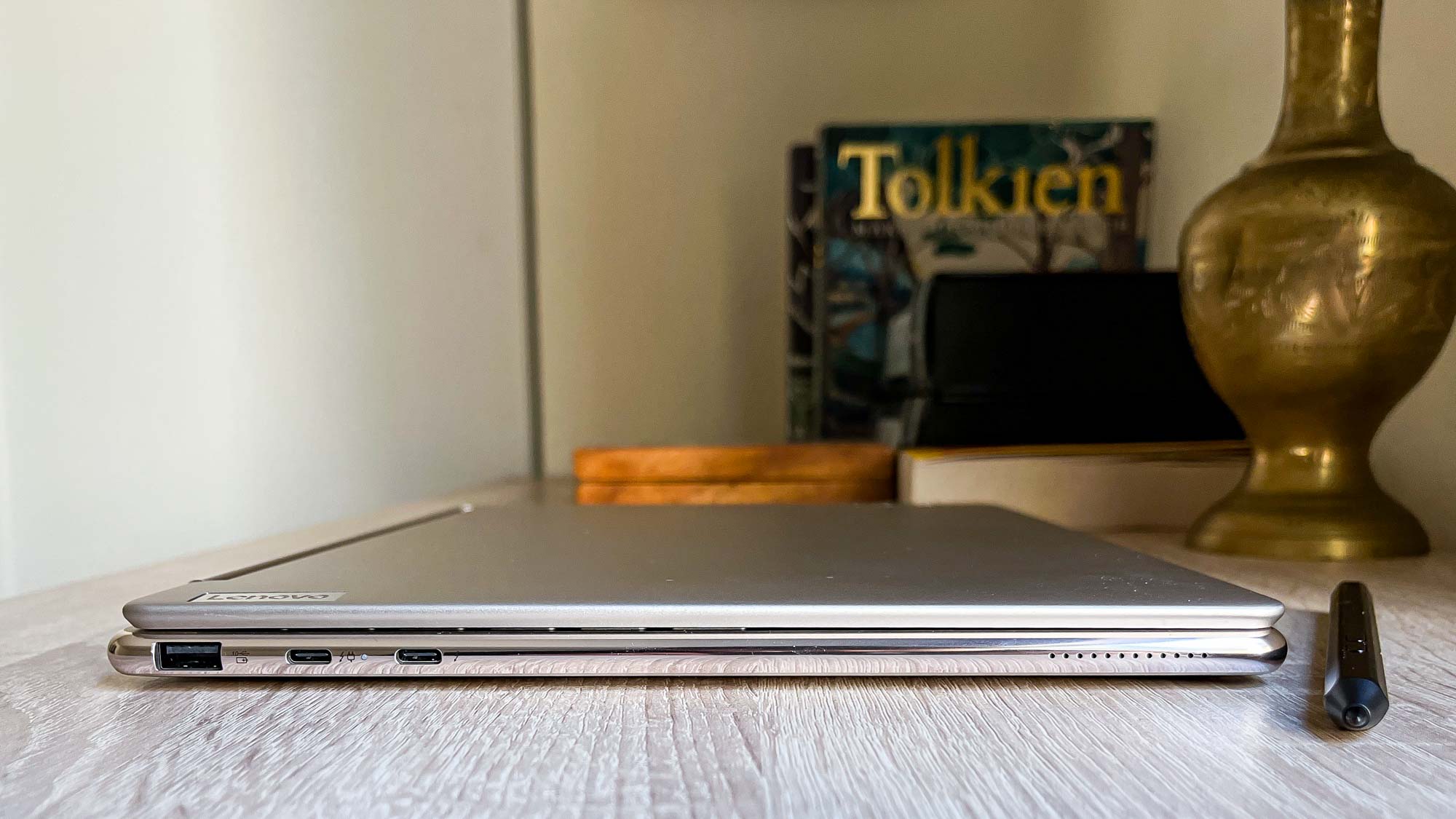
Placing the power button here on the side of the laptop, as though it were a giant tablet, makes sense given you're meant to hold it like a giant tablet on occasion, and having the power button on the keyboard would be problematic. But I also find that having the power button on the side of your laptop gets some getting used to, and there's a real danger of accidentally putting the Yoga laptop to sleep/powering it off when you're fiddling with a USB-C cable or folding the laptop up.
Lenovo Yoga 9i Gen 8 review: Display
- 2.8K OLED touchscreen looks luscious, but hard to use in direct sunlight
- Competitors offer better brightness and color accuracy
The 14-inch 2.8K (2,880 x 1,800 pixels) 90Hz 16:10 OLED touchscreen on our Lenovo Yoga 9i Gen 8 review unit looks vivid and rich in person, with colors so vibrant you might (if you're like me) yearn to touch them. Yet I hesitated to tap the Lenovo Yoga 9i's display for fear my dirty human fingers will mar its beautiful (yet comparatively dim) surface.
This is a fear I quickly got over, and I was able to minimize fingerprints appearing on the reflective display with a combination of a cheap microfiber cleaning cloth and a strict ban on all finger foods. The effort paid off: Movies, images and games look great on our Yoga 9i Gen 8 review unit's 2.8K OLED touchscreen thanks to its vivid colors and sharp contrasts.
The latest Yoga 9i sports an oversaturated OLED display that looks great but gets hard to make out in direct sunshine. "
The display also does a great job of swiftly picking up inputs from Lenovo's included stylus, and I enjoyed using it to play games and navigate movies after work with the laptop flipped over like a tent on my desk.
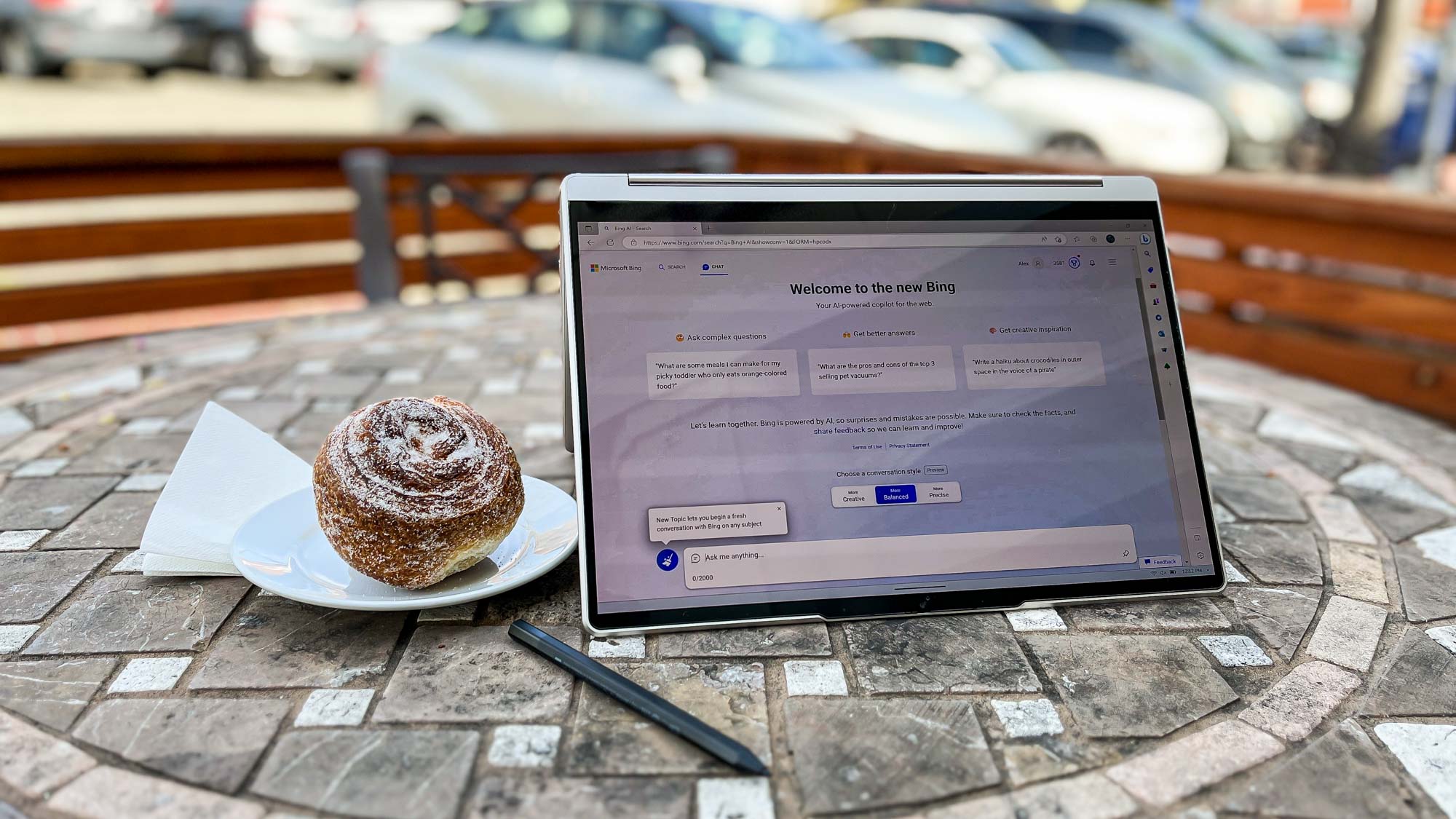
I had a harder time using the Yoga 9i out on the patio of a local coffee shop during lunch hour, when the meager sunlight of a March afternoon made watching A24's The Green Knight on the laptop nearly impossible. You can get things done outdoors if you dial the brightness up to max, but expect to be doing a lot of squinting and looking for shade.
The results of our lab testing back up my experience. When we pointed our Klein 10-A colorimeter at it we measured the Lenovo Yoga 9i's display's average brightness as 353 nits, peaking at 356 nits in the upper-left area of the screen. That's less than Lenovo's advertised peak of 400 nits, and less bright than its predecessor the Lenovo Yoga 9i Gen 7 (364 nits) we tested with a similar 2.8K OLED touchscreen. It's also dimmer than the Galaxy Book 3 Pro 360 (380 nits), the Acer Swift 5 (457 nits) and the Spin 5 (480 nits).
As far as color accuracy goes, our Yoga 9i Gen 8 review unit looks super-saturated for a reason. It achieved 200.6% of the sRGB color gamut and 142.1% of the DCI-P3 color gamut (100% is most accurate, higher tends to look more vivid) with a Delta-E score of 0.39 (the closer to 0, the better).
Those are awfully high numbers compared to most laptops we test, but they're right in line with what I expect from Lenovo's Yoga 9i given that last year's model achieved similar scores (194.9% sRGB, 138.1% DCI-P3). To give you some context, these scores are significantly higher than what we measured on the less saturated displays of competition like the Swift 5 (131.7% sRGB, 93.3% DCI-P3) or Spin 5 (130.1% sRGB, 92.1% DCI-P3).
In short, the latest Yoga 9i sports an oversaturated OLED display that looks great but gets hard to make out in direct sunshine. It's a luscious choice for watching movies or browsing the web, but if you want to do work that demands anything approaching color accuracy you should probably stick with a laptop like the Swift 5 or the MacBook Pro 14-inch.
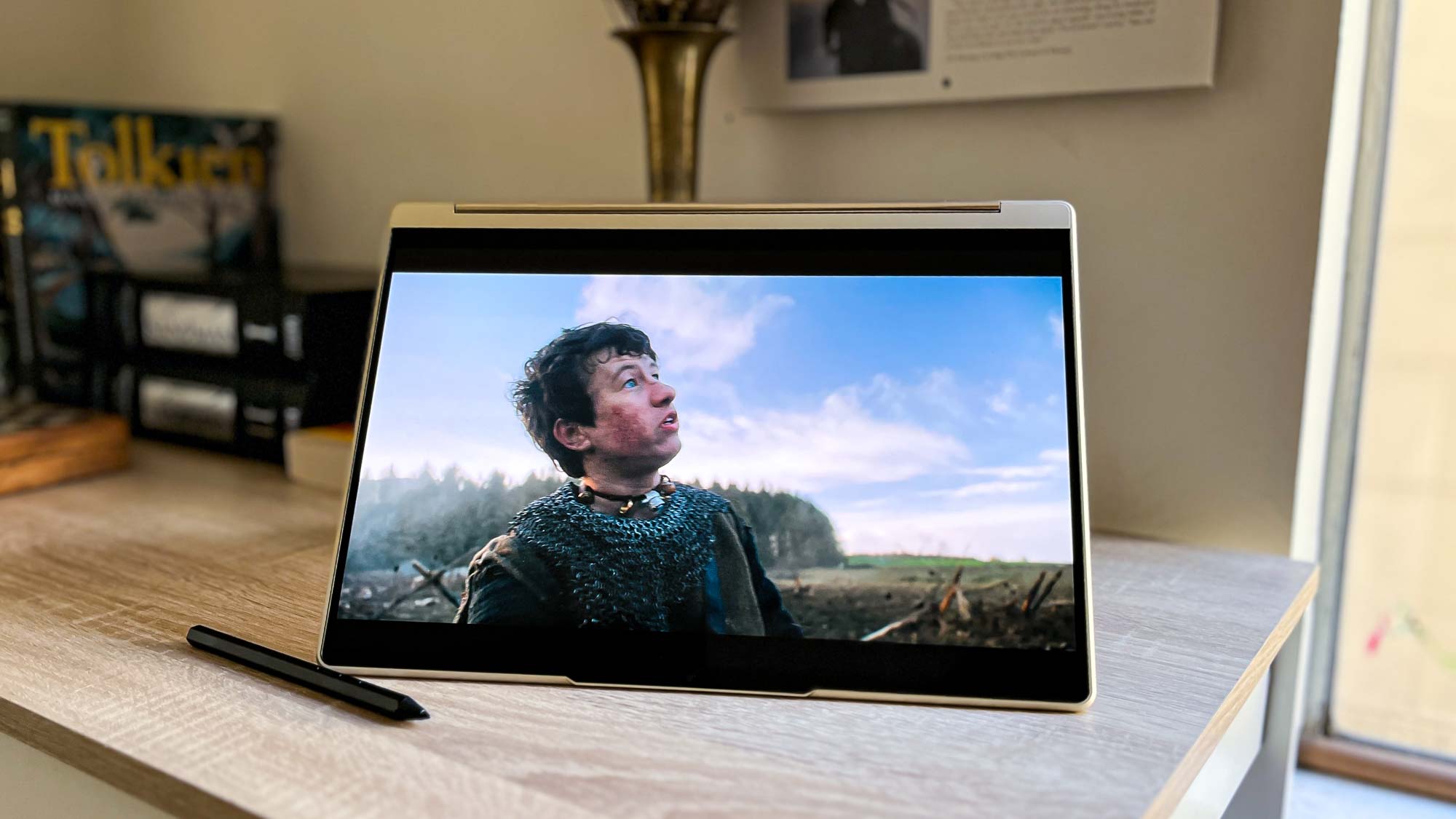
Note that while a 2.8K resolution sounds great on paper, in person on a 14-inch screen it makes text nearly unreadable. You can try to squint through it if you want to, but I prefer to dial up the screen magnification to 200% in Windows 11's display settings.
Lenovo Yoga 9i Gen 8 review: Audio
- Rotating soundbar delivers great audio in clamshell or tablet mode
- Gets quite loud, with decent bass
The rotating soundbar that forms the hinge between the Yoga 9i Gen 8's screen and deck is one of the standout features of this laptop. Bearing the Bowers & Wilkins imprimatur and kicking out higher-quality audio than I usually expect from a 14-inch ultraportable, this soundbar is designed to sound equally good no matter how you fold the laptop.
Inside are a pair of 2-watt tweeters that, when complemented by the pair of 3-watt woofers built into the corners of the laptop, made tracks from the likes of The Mountain Goats, Open Mike Eagle and Taylor Swift sound rich and full.
While the soundbar on the Yoga 9i won't fool you into thinking its a proper stereo anytime soon, it delivers higher-quality audio at a louder volume than just about any laptop of this size I've ever tested. The only two laptops we've tested recently which deliver comparable audio quality are the Surface Laptop 5 (something about the way it reflects sound towards you really gives it a punch) and the MacBook Pro.
Lenovo Yoga 9i Gen 8 review: Performance
- Speedy enough for work, school and some light gaming
- Outperforms its predecessor, but outpaced by the competition
The 13th Gen Intel CPU in our Lenovo Yoga 9i review unit gives it more than enough power to handle my day-to-day workload, which involves flitting between countless Chrome tabs while streaming music and occasionally watching videos. It even has enough muscle for some light gaming, though complex, graphically-demanding games will bring this laptop to its knees.
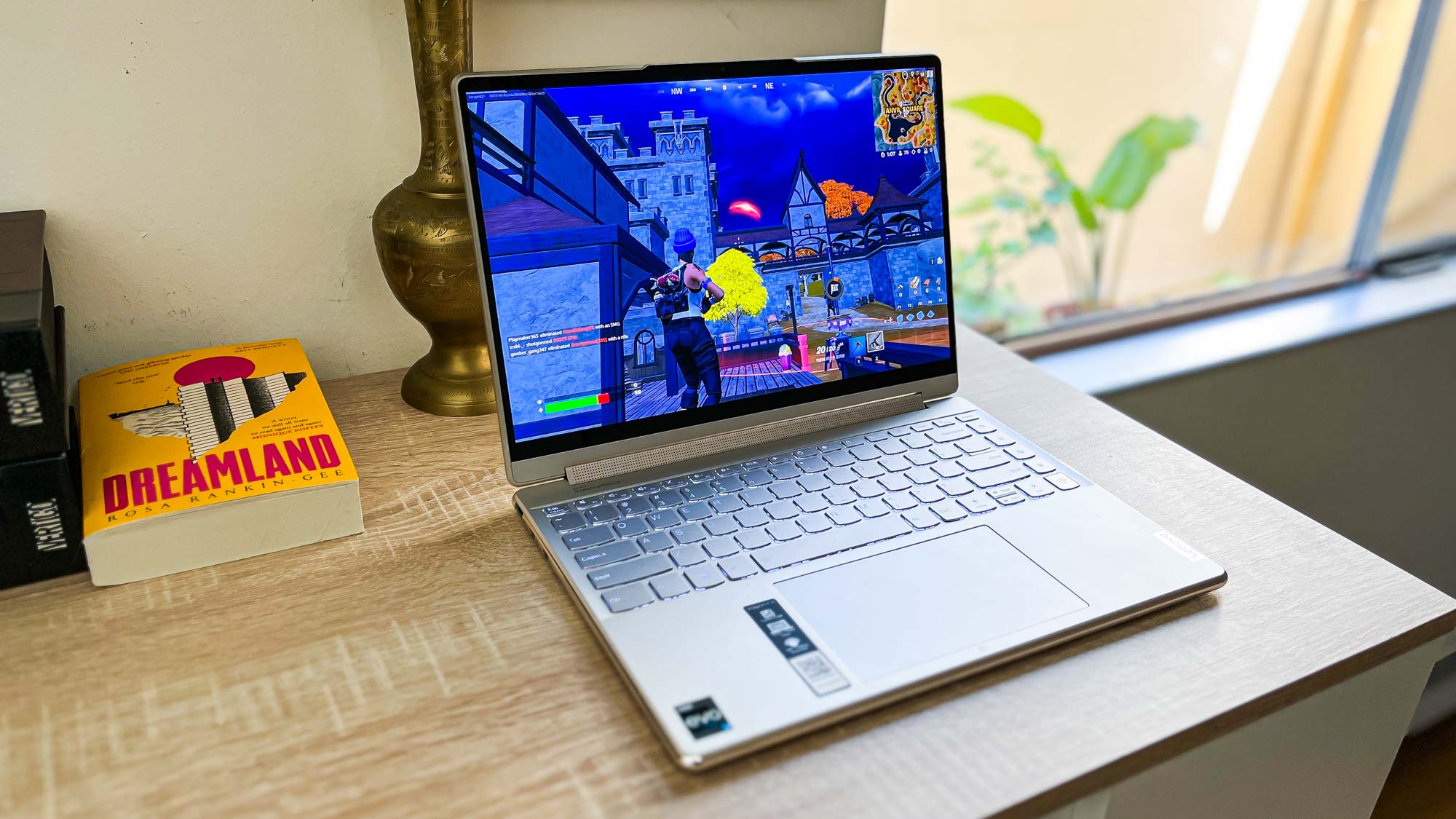
The Lenovo Yoga 9i Gen 8's performance in our testing lab backs up my experience. When we put it to the test in the Geekbench 5.6 multi-core CPU benchmark it earned a score of 9,954, which is better than its predecessor's score of 7,150. It's also neck and neck with the Acer Swift 5 (9,859) and Spin 5 (10,040), which is interesting since both pack the same outdated (though still fairly new) 12th Gen Intel Core i7 CPU as the old Yoga 9i Gen 7.
Across the rest of our test results we see a similar theme emerging: Lenovo's Yoga 9i Gen 8 is a significant improvement over its predecessor, but it struggles to outperform the competition by a similar margin.
In our video editing test, for example, which tasks the laptop with transcoding a 4K video down to 1080p using Handbrake, the Lenovo Yoga 9i Gen 8 took 9 minutes and 45 seconds. That's a bit long, and though it's still several minutes faster than its predecessor's time in the same test (12:18) it's still slower than older, cheaper 14-inch laptops like the Acer Swift 5 and Spin 5.
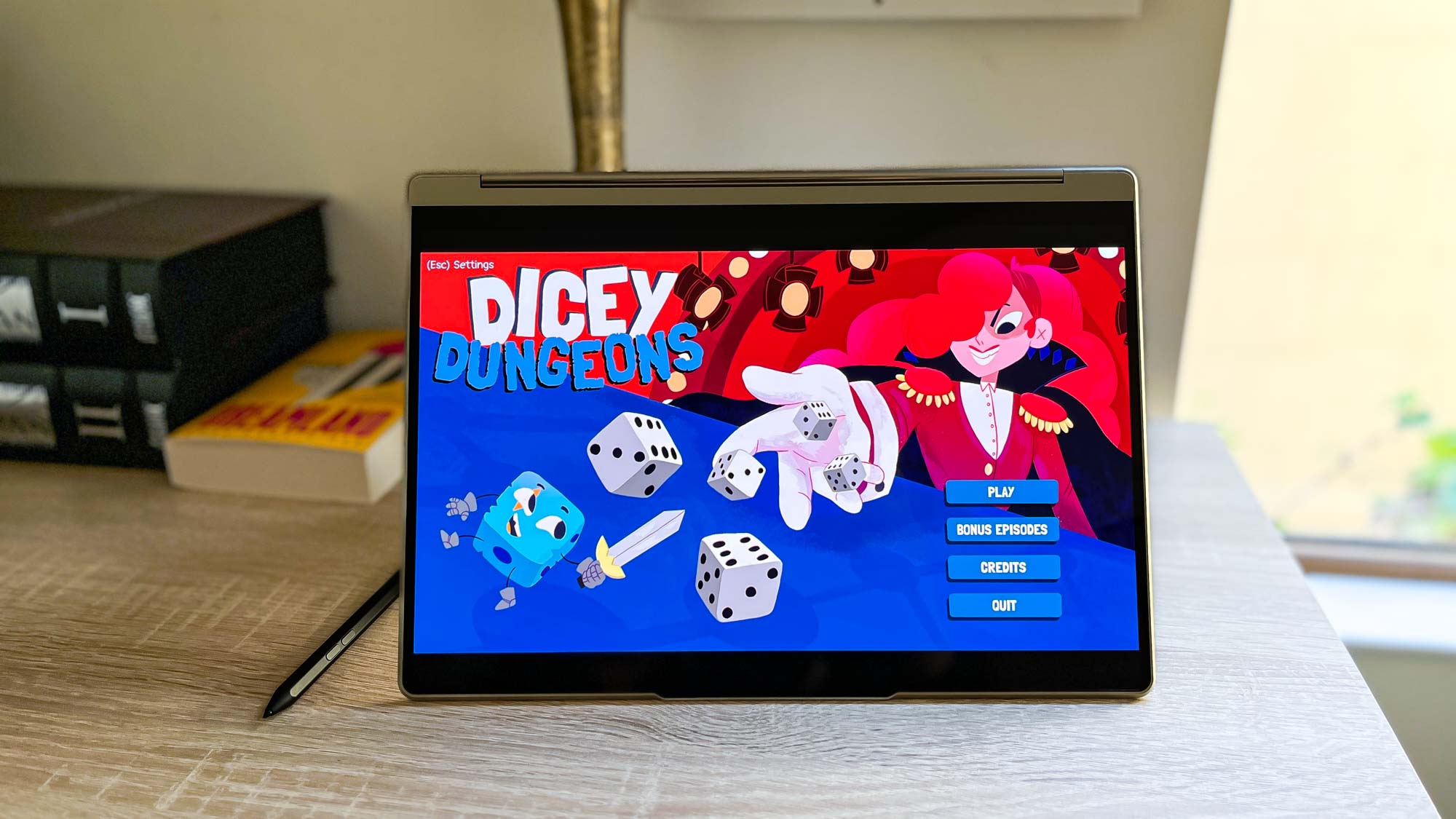
A similar pattern plays out across the results of our SSD speed test, which tasks a laptop with duplicating 25GB of multimedia files as fast as possible. Our Lenovo Yoga 9i Gen 8 review unit did well enough in this test, demonstrating a transfer rate of up to 1,669 MBps. That's faster than its predecessor (1,506 MBps) by a small but meaningful margin, and it's also faster than the Acer Swift 5 (1,673 MBps) and Spin 5 (1,395 MBps) I previously mentioned.
While the Yoga 9i lacks the discrete graphics card and extra horsepower of the best gaming laptops and thus can't run many of the best PC games well, you can still have some fun with it.
We like to run just about every laptop we test through the Sid Meier's Civilization VI: Gathering Storm benchmark since it's a game that runs on just about everything (including Macs and PCs), and the Yoga 9i Gen 8 managed to deliver a decent score of 25 frames per second. That's better performance than we see out of a lot of ultraportables, including its predecessor (22 fps). However, both the Acer Spin 5 (28 fps) and Swift 5 (25 fps) met or exceeded the Yoga 9i's performance.
That said, I still had loads of fun playing lightweight games like Crusader Kings III, Dicey Dungeons and Into the Breach on the Yoga 9i with little trouble.
Lenovo Yoga 9i Gen 8 review: Battery life and heat
- 10 hours of tested battery life is good enough for a day at work or school
- Outlasts its predecessor but outclassed by the competition
Our Lenovo Yoga 9i Gen 8 review unit lasted longer than its predecessor in our battery test, but it still can't match the best laptops for battery life. In our in-house battery rundown test, which tasks the laptop with surfing the web via Wi-Fi with its screen brightness set to (the relatively dim) 150 nits, the Lenovo Yoga 9i Gen 8 lasted roughly 10 hours and 10 minutes before running out of juice. That should be enough to get you through an average day of work or school, but you might want to carry the charger with you just in case.
It's better than the roughly 8 hours its predecessor lasted in the same test, but as you can see from the chart below, it pales in comparison to the 12+ hour average battery life we see from top-tier ultraportables.
While the Yoga 9i Gen 8 offers better battery life than the anemic Dell XPS 13 Plus, it's outpaced by nearly every non-gaming laptop we've recently tested.
This may have something to do with the high-res 90Hz OLED display, which may eat up battery faster than some of the lower-resolution non-OLED screens on competitors like the Acer Spin 5 or MacBook Pro 2023. The fact that the 1080p AMOLED-equipped Samsung Galaxy Book 2 Pro 360 lasted nearly 12 hours in our battery test while its successor, the 3K AMOLED-equipped Galaxy Book 3 Pro 360, lasted barely 8 hours in the same test lends more credence to this hypothesis.
The Yoga 9i's middling battery life isn't so bad when you consider that Lenovo claims the laptop's Rapid Charge Boost tech gives it up to two hours of runtime after charging it for 15 minutes. In my hands-on testing I was able to pull this off, but only when plugging the power adapter into the USB-C port on the righthand side of the laptop. You can charge the laptop via any of its USB-C ports, including the two Thunderbolt 4 ports on the opposite side, but when I used those to charge the laptop it only gained about 6% battery power after 15 minutes plugged in.
Heat-wise I never got particularly hot or bothered while using the Lenovo Yoga 9i in my lap. In our heat test, which involves tasking the laptop with playing an HD video for 15 minutes and then scanning it with a heat gun, the laptop's surface temps stayed well under 100 degrees Fahrenheit. The hottest spot we found was in the center of its underside near the rear vent, which got as hot as 94.1 degrees.
Lenovo Yoga 9i Gen 8 review: Keyboard and touchpad
- Comfortable, well-spaced keyboard and touchpad
- Dedicated function keys are neat but not worth the space they take up
The keyboard on the Lenovo Yoga 9i Gen 8 is comfortable to type on, with nicely-spaced keys that spread across the full width of the deck. While key travel is what you'd expect from a 14-inch laptop, the Yoga 9i's keys feel nice and responsive beneath my fingers.
However, I'm less pleased by the inclusion of dedicated hotkeys along the righthand side of the keyboard. Lenovo brands them "1-Click function keys" and they include (from bottom to top) a dedicated fingerprint reader, a key to switch between light and dark themes, a button to toggle between audio profiles (for music, movies or gaming), a key to enable/disable your camera's background blur on calls, and one to switch between power profiles.
I'm less pleased by the inclusion of dedicated hotkeys along the righthand side of the keyboard. All but the fingerprint reader seem redundant, tying up a whole key on the keyboard for the purpose of quickly changing a single setting."
Each of these keys seem useful, at first glance, and I still enjoy fiddling with them when I'm bored during a call. But after using them for a week or so I have to say I've quickly lost respect for their existence. All but the fingerprint reader seem redundant and unnecessary, tying up a whole key on the keyboard for the purpose of quickly changing a single setting. This becomes especially annoying when you see how many of the function keys have assigned functions that are similarly superfluous. The F9 key, for example, bears a tiny icon of a person wearing a headset and launches the Lenovo Vantage app when you press it.
That's a nice keyboard shortcut to have, but one many owners (myself included) will rarely use. If Lenovo is dead-set on providing dedicated keys that flip between settings for features like the webcam, the battery and the display, I'd rather it kept those keys on the function row (culling the lease useful ones to make room) rather than taking up more space on the keyboard itself.
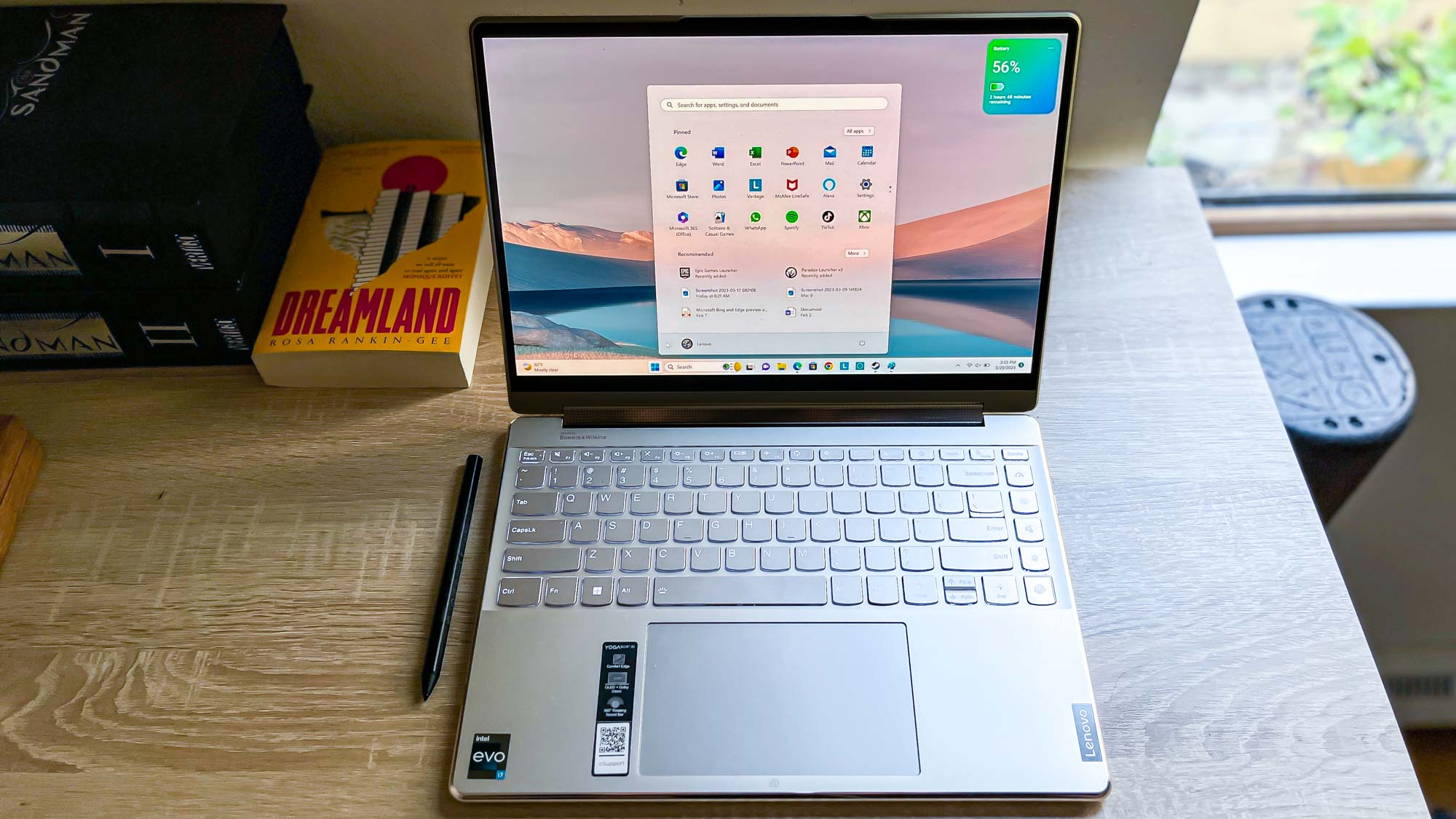
Below the keyboard you'll find a well-sized trackpad that should give you no trouble. During my hands-on testing I never once noticed it fail to read a swipe, and I had no trouble navigating Windows 11 using gesture commands. It also never failed to register a click no matter where I pressed on the touchpad.
Lenovo Yoga 9i Gen 8 review: Stylus
- Two-button active stylus works well with the display
- Lack of a dedicated charging garage raises odds of a lost/dead stylus
If you'd rather not navigate via the touchpad you can also use the included stylus to control the mouse in Windows 11, though you may need to fiddle with some options in the Pen & Windows Ink settings menu to do so.
The stylus itself is a slim black cylinder with a flat end opposite the pointy one and two buttons near the point. You can configure what these buttons do in settings menus, including things like launching programs or opening windows in which you can hand-write text that is then read and input into fields in programs like web browsers and word processors.
During our review period I enjoyed using Lenovo's packed-in stylus to doodle notes on the Yoga 9i during meetings and not much else. For me it's nice to have, but the stylus is a little too short and thin to feel comfortable in my massive mitts during extended use.
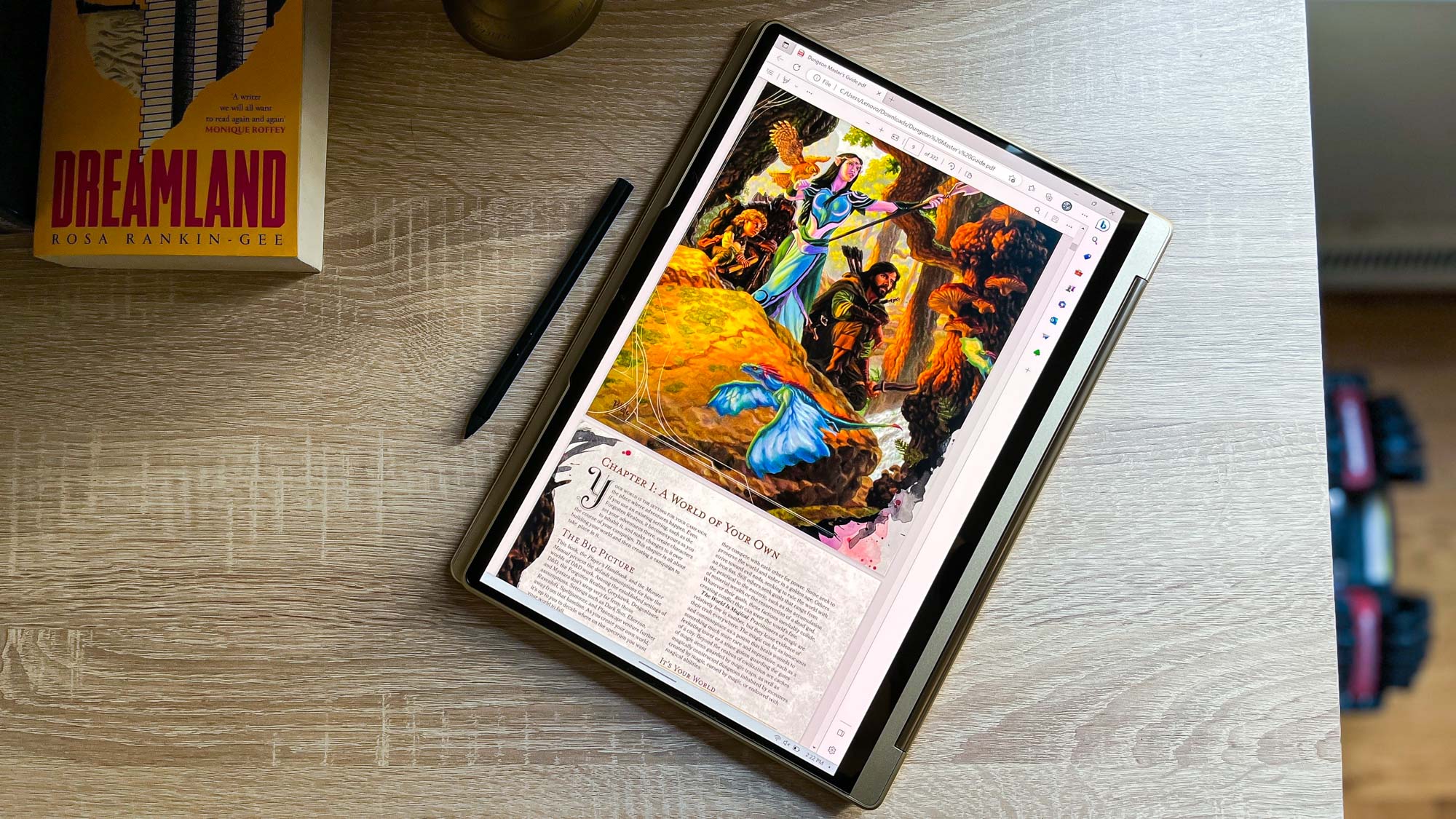
But I'm also not much of an artist or even a physical note-taker these days, so don't take my lack of interest as a damning indictment of the Yoga 9i's stylus and support software. I sure wish Lenovo had built some form of stylus charging garage into the Yoga 9i, but the stylus is good enough and useful enough to be worth the hassle of charging it, which requires you to pull off the rubber stopper on the flat end to reveal a USB-C charging port. Thankfully, the stopper is connected to the stylus by a bit of material, giving you one less thing to lose.
Lenovo Yoga 9i Gen 8 review: Webcam
- 1080p webcam delivers good enough image and video quality
- IR camera allows you to log into Windows with your face
The 1080p webcam built into the top bezel of the Yoga 9i Gen 8's display is good enough for video calls with friends, family and colleagues. It can be toggled on and off via software settings and you can also slide a physical privacy shutter over it for more confident privacy, though the small piece of black plastic you need to slide back and forth to engage the shutter is so small (and nestled so deep into the bezel above the webcam) that it's almost impossible to see if you don't know it's there.
In the course of using the webcam during a normal remote workweek I found it made me look nice and sharp on Google Meet calls, with good color accuracy. However, I also noticed it has a tendency to make me look faded and washed-out in dim lighting, a hassle which is easily avoided if you can control the lights in your workspace.
Since it also sports an IR camera you can use the Yoga 9i's webcam to log into your laptop with your face via Windows Hello. I prefer to use the fingerprint reader on the keyboard for biometric authentication, but during the review process I tested how reliably and quickly I was able to log into the Yoga 9i via facial recognition — and was happy to see it reliably happened in seconds every time.
Lenovo Yoga 9i Gen 8 review: Software
- No meaningful bloatware other than 6+ Lenovo apps
- About half of them are worth using
The Lenovo Yoga 9i doesn't come with too much extraneous software, but there are a number of pre-installed Lenovo apps you'll want to know about. There are at least six on the laptop, but the ones you should care about are Lenovo Vantage, Lenovo Voice and Lenovo Pen Settings.
Lenovo Pen Settings is self-explanatory, giving you a menu to modify handy settings like what the buttons on the stylus do and how sensitive the pen is to pressure and tilt.
Lenovo Vantage is also useful because it gives you easy access to buttons that let you search for system updates, change settings on the microphone, speakers, camera and more. You can also enable advanced features like zero touch login or lock (which uses the camera to automatically wake the PC and log you in when it detects you approaching, or lock it when you leave). Most of what Lenovo Vantage allows you to do is easily done via Windows' own settings menus, but it's still nice to have.
Lenovo Voice is worth at least messing around with, as it's Lenovo's software for controlling your PC with your voice. This is something I already do a lot of through the Windows 11 Voice access app because I have bad RSI pain in both hands, so I'm well-equipped to tell you that Lenovo Voice is fine but not nearly as good as Windows' own Voice access app.
While Lenovo Voice does let you do things like dictate text or launch Microsoft Word by saying "open Word," I found it couldn't match either the responsiveness, accuracy, or versatility of Windows Voice access. Voice access gives you at least two different ways of telling the PC where to physically click on the screen, for example, functionality Lenovo Voice can't match.
So while I encourage you to check out what you can do with Lenovo Voice — the fact that you can create custom commands that fire off when you give specific phrases is cool — it pales in comparison to the more robust, versatile (and free) Windows Voice access app.
Lenovo Yoga 9i Gen 8 review: Verdict
The Lenovo Yoga 9i Gen 8 is an excellent 2-in-1 laptop that feels like a premium piece of tech. From its polished, rounded aluminum edges to the vibrant OLED display crowning the punchy soundbar, every inch of this laptop feels classy.
It doesn't just look good on a desk, either; this convertible is speedy enough for day-to-day work at home, in the coffee shop or in class. With its $1,399 starting price tag it's priced to compete with laptops and 2-in-1s that don't look or sound half as nice, and the included stylus and carrying sleeve with every Yoga 9i is icing on the cake.
However, the fact that Lenovo no longer builds a charging garage into this laptop limits the utility of the stylus and increases the odds of losing it. And as well-rounded and appealing as our Yoga 9i review unit is, it still falls short of the competition in some key ways.
Most notably, the display is dimmer yet far more saturated than similarly-priced and similarly-sized competitors like the Acer Spin 5 and the Acer Swift 5. They both also outperform our Yoga 9i review unit in terms of both raw CPU power and video editing, despite being competitively priced and packing older CPUs than the 13th Gen Intel Core i7 in our review unit. They also both outlasted the Yoga 9i in our battery rundown test, as do many of the ultraportables we test these days.
So if you want a beautiful Windows 2-in-1 with stylus included that will serve you equally well in class or in the conference room, the Lenovo Yoga 9i is one I heartily recommend — as long as you know the downsides as well as the benefits.
If you want a laptop of this size specifically for gaming or video editing and don't mind it not turning into a tablet you'd probably be happier with the Asus ROG Zephyrus G14, a 14-inch gaming laptop that's competitively priced with the Yoga 9i. If you don't mind macOS, Apple's MacBook Pro 14-inch is more expensive than the Yoga 9i (and lacks its touchscreen or 2-in-1 versatility) but delivers far more power for photo and video editing, as well as a brighter and more color-accurate display.







